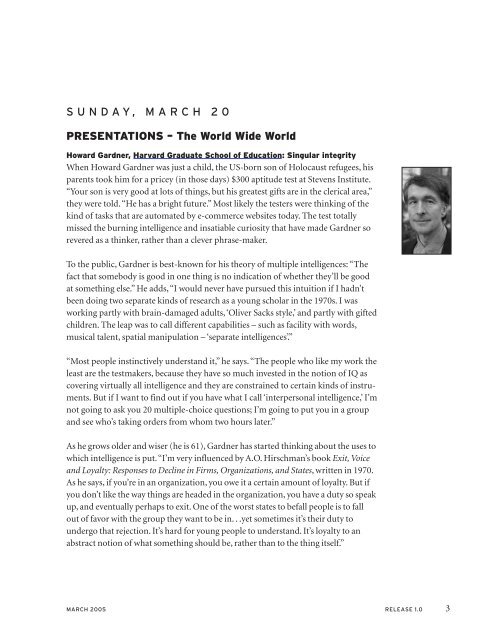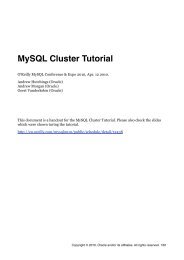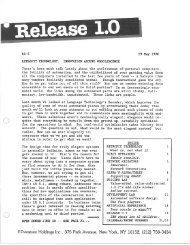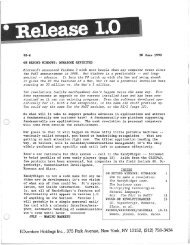The World Wide World: IT Ain't Just the Web ... - Cdn.oreilly.com
The World Wide World: IT Ain't Just the Web ... - Cdn.oreilly.com
The World Wide World: IT Ain't Just the Web ... - Cdn.oreilly.com
Create successful ePaper yourself
Turn your PDF publications into a flip-book with our unique Google optimized e-Paper software.
SUNDAY, MARCH 20<br />
PRESENTATIONS – <strong>The</strong> <strong>World</strong> <strong>Wide</strong> <strong>World</strong><br />
Howard Gardner, Harvard Graduate School of Education: Singular integrity<br />
When Howard Gardner was just a child, <strong>the</strong> US-born son of Holocaust refugees, his<br />
parents took him for a pricey (in those days) $300 aptitude test at Stevens Institute.<br />
“Your son is very good at lots of things, but his greatest gifts are in <strong>the</strong> clerical area,”<br />
<strong>the</strong>y were told. “He has a bright future.” Most likely <strong>the</strong> testers were thinking of <strong>the</strong><br />
kind of tasks that are automated by e-<strong>com</strong>merce websites today. <strong>The</strong> test totally<br />
missed <strong>the</strong> burning intelligence and insatiable curiosity that have made Gardner so<br />
revered as a thinker, ra<strong>the</strong>r than a clever phrase-maker.<br />
To <strong>the</strong> public, Gardner is best-known for his <strong>the</strong>ory of multiple intelligences: “<strong>The</strong><br />
fact that somebody is good in one thing is no indication of whe<strong>the</strong>r <strong>the</strong>y’ll be good<br />
at something else.” He adds, “I would never have pursued this intuition if I hadn’t<br />
been doing two separate kinds of research as a young scholar in <strong>the</strong> 1970s. I was<br />
working partly with brain-damaged adults, ‘Oliver Sacks style,’ and partly with gifted<br />
children. <strong>The</strong> leap was to call different capabilities – such as facility with words,<br />
musical talent, spatial manipulation – ‘separate intelligences’.”<br />
“Most people instinctively understand it,” he says. “<strong>The</strong> people who like my work <strong>the</strong><br />
least are <strong>the</strong> testmakers, because <strong>the</strong>y have so much invested in <strong>the</strong> notion of IQ as<br />
covering virtually all intelligence and <strong>the</strong>y are constrained to certain kinds of instruments.<br />
But if I want to find out if you have what I call ‘interpersonal intelligence,’ I’m<br />
not going to ask you 20 multiple-choice questions; I’m going to put you in a group<br />
and see who’s taking orders from whom two hours later.”<br />
As he grows older and wiser (he is 61), Gardner has started thinking about <strong>the</strong> uses to<br />
which intelligence is put.“I’m very influenced by A.O. Hirschman’s book Exit, Voice<br />
and Loyalty: Responses to Decline in Firms, Organizations, and States, written in 1970.<br />
As he says, if you’re in an organization, you owe it a certain amount of loyalty. But if<br />
you don’t like <strong>the</strong> way things are headed in <strong>the</strong> organization, you have a duty so speak<br />
up, and eventually perhaps to exit. One of <strong>the</strong> worst states to befall people is to fall<br />
out of favor with <strong>the</strong> group <strong>the</strong>y want to be in. . .yet sometimes it’s <strong>the</strong>ir duty to<br />
undergo that rejection. It’s hard for young people to understand. It’s loyalty to an<br />
abstract notion of what something should be, ra<strong>the</strong>r than to <strong>the</strong> thing itself.”<br />
MARCH 2005 RELEASE 1.0 3
















